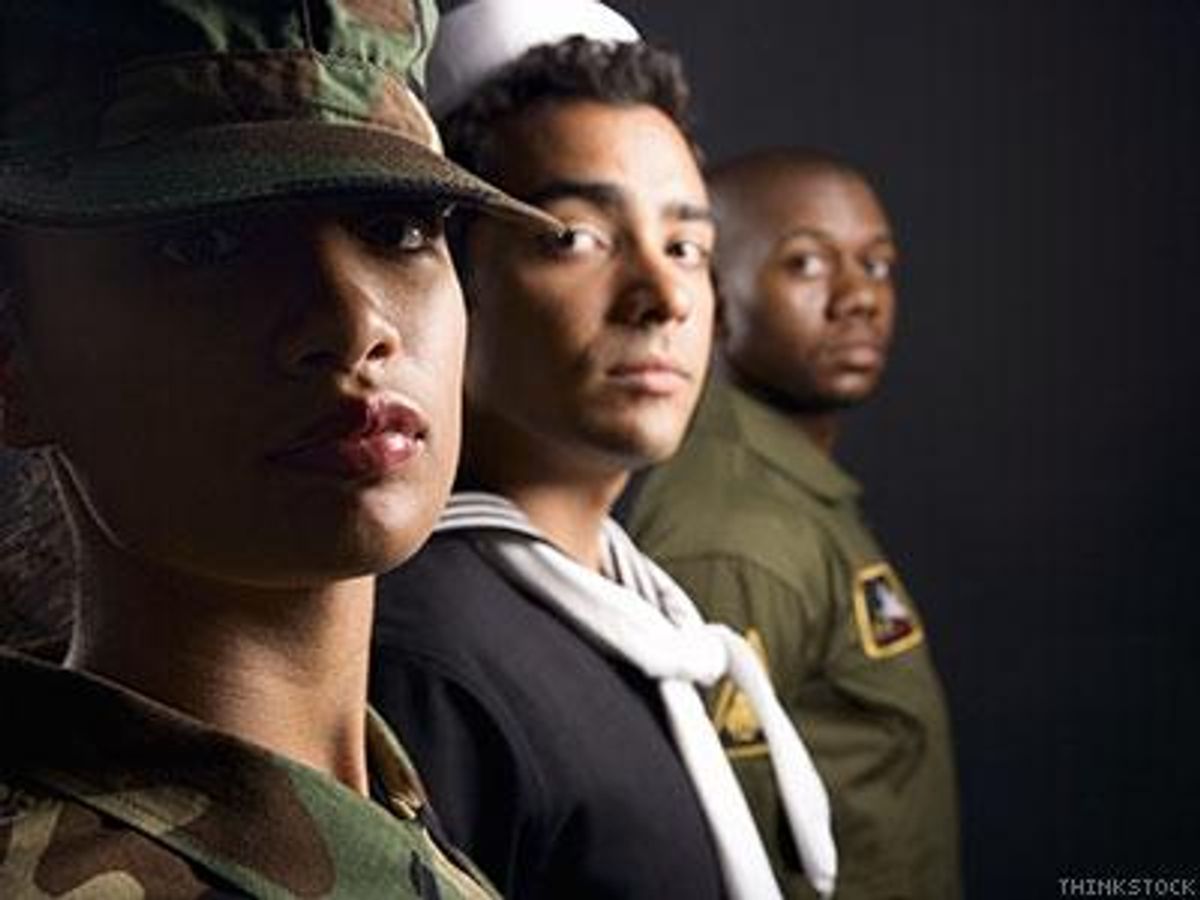Last Sunday, a young Navy officer serving in Afghanistan made history with an act of bravery that's made headlines around the world.
It took place during a "commander's call" in Kandahar, Afghanistan, where the new secretary of Defense, Ash Carter, was speaking to troops on his first visit to the country. When he finished his remarks and called for questions, Lt. Cmdr. Jesse Ehrenfeld of the U.S. Navy Medical Corps raised his hand. He thanked Carter for speaking with them, then asked, "Sir, what are your thoughts on transgender service members serving in an austere environment like this?"
Carter's response -- "I don't think anything but their suitability for service should preclude them [from serving]" -- was his first public comment on the issue and the most favorable from a senior U.S. military official to date. Within hours, his openness to allowing transgender Americans to serve was being reported by news outlets all over the world. By Monday, the White House chimed in with its enthusiastic support, sparking even more media attention. The coverage has helped jump-start a public conversation on transgender military service that seemed stalled in the final months of former Secretary Chuck Hagel's tenure at the Pentagon.
What most news reports have missed, though, is the fact that until recently Lt. Cmdr. Ehrenfeld would not have been allowed in the room to ask the question that started it all. As an openly gay man, he would have been barred from military service by the discriminatory policy known as "don't ask, don't tell."
If you're a lesbian, gay, or bisexual American serving in the military, Ehrenfeld's question sets a powerful example of allyship. Here are three questions you can ask to follow his example and help make change for transgender people serving alongside you.
1. Ask your peers, "What do you think?"
Secretary Carter's comments, and the extensive coverage they've received in the media, offer you the perfect opportunity to engage your colleagues and friends in conversation. So next time you're hanging out in the motor pool, the mess hall, the gym, or the exchange, ask the people you work with, "Did you hear what SECDEF said about transgender people serving in the military? What do you think about it?" It will likely take some courage to do that, but every true act of allyship does. Think back to your military history: Allies are the ones who are willing to step up and take a risk alongside you, right? So take the risk and ask.
If you do, it's likely you'll hear some myths and misconceptions about transgender people and our ability to serve. Be prepared to answer with facts; let others know transgender people aren't medically unfit and 18 other countries have already figured this out. Tell them about veterans like Landon Wilson, Brynn Tannehill, and Kristin Beck. And if, in spite of the facts, your peers still aren't comfortable with the idea of transgender people serving with them? Well, you might remind them that a lot of people used to feel the same way about serving with people like you.
2. Ask yourself, "How can I support the transgender service members in my unit?"
And you can be sure there are transgender people in your unit, even if you've never seen them or heard them. Research conducted by the Williams Institute at the University of California, Los Angeles, shows there are more than 15,000 transgender people serving today. That's at least one in every Army company and 130 in every active division; it means seven in each Air Force fighter wing and over 40 on every aircraft carrier in the Navy. Most are alone and afraid to talk to anyone about themselves or their lives, just like you were only a few years ago.
But you don't need to know who they are to support them. When you hear someone use an antitransgender slur, tell a bigoted joke, or speculate crudely about Bruce Jenner, say something about it. Call them out: "Hey, cut that out. That's not cool." By refusing to tolerate antitransgender speech, you're helping create a climate in your unit where transgender service members can feel just a little more welcome. And when you're alone and afraid, every little bit helps.
On the other hand, allowing antitransgender comments and jokes to continue when you're around implies to others that you're OK with them -- and the transgender service members around you feel more isolated and fearful. Don't become part of the problem.
3. Ask your chain of command, "What are we doing about this?"
At first blush, this might seem out of place, even inappropriate. But wearing the uniform doesn't insulate you from asking the hard questions. That's the kind of thinking that led to the My Lai massacre and the Abu Ghraib atrocities. As a soldier, sailor, airman, or Marine, it's your duty to ask the hard questions -- to take responsibility for ensuring our military lives up to its values. So ask your section chief, your gunny, or your CO. And if the new secretary of Defense or one of our other senior leaders visits your base, ask them too. That's why they're there. And who knows? You might ask the question that finally puts DoD's outdated, discriminatory policy to bed for good.
If you're a lesbian, gay, or bisexual member of the U.S. military today, you're able to serve because somewhere, while "don't ask, don't tell" was still in force, an ally asked the hard questions you couldn't ask. Now it's your turn.
ALLYSON DYLAN ROBINSON is a transgender Army veteran and director of policy at SPARTA, an association of LGBT people who currently serve in the military as well as veterans and LGBT advocates and allies committed to repealing the transgender military ban and establishing true equality in the U.S. military.

















































































Viral post saying Republicans 'have two daddies now' has MAGA hot and bothered